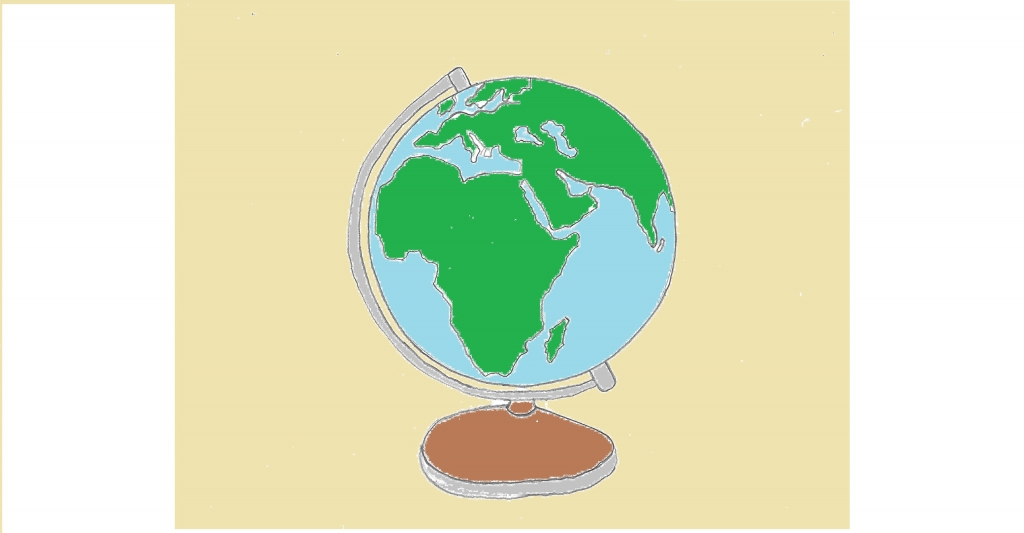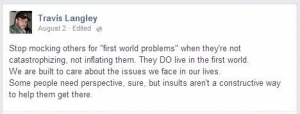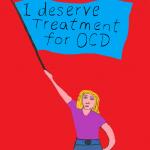OCD isn’t a first world problem
September 21st 2015
About the author: Rachel is sixteen years old and has just finished GCSEs. She lives in London and has had OCD for about 2 years.
Many people with varying mental illnesses, including OCD are dismissed by being told they have a “first world problem”, which causes offense, beside the problematic nature of the term itself, which I’ll discuss later in the post.
Here are a few reasons why OCD, and/or mental illness is not “just a first world problem”.
1) Fear and anxiety are universal among all people so everyone should be understanding of why something that causes frequent, intense anxiety or fear is a problem. Also, most people have something they are scared of that may not make sense to other people, but still causes fear e.g. Fear of spiders when the spider poses no threat.
2) OCD, and mental illnesses in general, occur all over the world, in all situations.“The incidence of mental health disorders varies widely across the globe, and determining the patterns is tricky. After the U.S., Ukraine, Colombia, New Zealand, Lebanon, and France have the next highest rates of mental health disorders of any kind, all falling between 18.9 percent and 21.4 percent in a 12-month period. Japan, the People’s Republic of China, Nigeria, and Israel have the lowest rates (between 6.0 percent and 7.4 percent), especially for depression.”
(Quote from http://www.theatlantic.com/health/archive/2011/10/why-more-americans-suffer-from- mental-disorders-than-anyone-else/246035/#slide3)
3) Mental illness can be as much, if not more, of a problem in less developed countries.
According to the Guardian:
“Nora Mweemba, who works for the WHO in Zambia, explains that many people suffering from mental health problems don’t come forward for treatment because “communities still regard mental health as a misfortune in the family or some sort of punishment [from God]”. What treatment is delivered tends to rely on traditional healers who often interpret mental illness in terms of possession or curse….Human rights violations of psychiatric patients are common, with patients physically restrained, isolated and denied basic rights. There are therefore significant cultural barriers to overcome to deliver mental health policies.”
(Quotes from http://www.theguardian.com/commentisfree/2010/may/10/mental-illness-developing- world)
It is worth noting, however, that this is an example from just one country, and one person’s opinion, so one can’t generalise all less developed countries from this. Also, while abuse may be more common in this situation, mistreatment and abuse can happen in any country.
4) Mental illness is everywhere, but diagnosis rates may vary, so as well as the true rates of OCD, and mental illnesses in general varying from country to country, the diagnosed or reported rates may vary as well, distorting the statistics of mental illness. In countries with more stigma and abuse of people who have mental illnesses, people are less likely to report mental illness, out of fear of the consequences.
5) The obsessions and compulsions may be different in different areas, but OCD can occur anywhere. For example, someone who is religious is more likely to have intrusive thoughts about sinning than someone who doesn’t follow a religion. Someone who owns a car obviously is more likely to worry about it not being locked than someone who doesn’t own a car. But other intrusive thoughts e.g. about harm, relationships, magical thoughts etc. are not reliant on living in a certain country. For example: In “The Man Who Couldn’t Stop” by David Adam, an anecdote is told of a girl in Ethiopia (one of the poorest nations in the world) who developed OCD as she had intrusive thoughts of the wall of her house, and to remove the anxiety caused by these thoughts, she ate the wall bit by bit.
And some general reasons why saying something is a first world problem is demeaning and offensive:
1. An idea I have heard of on the internet is that we are not in the “Oppression Olympics”, trying to compete to be the most oppressed person around. As an example: Just because you live in a peaceful democracy, that doesn’t make being bullied irrelevant just because some countries are currently in war. There is probably someone in the world with a life that objectively seems more difficult than yours, but that doesn’t make your problems (mental illness, problems with family or friends etc.) suddenly irrelevant. Additionally, the problems or issues you have do not take away from or restrict help to war zones, humanitarian crises etc.
2. If you’re particular about it, the term first world is a bit outdated, as it refers vaguely to Cold War era groups of countries: first world being capitalists and/or allied to the USA, second world being communist countries and/or allied to the Soviet Union, and third world countries being anything else. A more accurate way to describe “first world” countries would be to say something like “more economically developed country”, but “more economically developed country problem” is probably not going to catch on. Additionally, this creates and deepens the “Us and Them” mentality that western countries such as the USA and the UK are completely separate from less economically developed countries.
3. Finally, something I saw at the bottom of this article
To sum up:
OCD, and mental illnesses in general, exist everywhere although the causes and prevalence may vary. Mental illness can be a more difficult problem in less developed countries with systematic abuse of people who are mentally ill- though this is not to ignore the fact that abuse or maltreatment of people with mental illness can and does take place anywhere.Everyone experiences problems in their own lives, and because globally, people live in very different situations, the things that one views as a problem will obviously vary- we are not in an “oppression Olympics”.
A discussion on high existence on whether mental illness is a first world problem: http://www.highexistence.com/topic/mental-illness-is-a-first-world-problem/
A PDF of a World Health Organization document on “Mental Health: New Understanding, New Hope”: Which included information about mental illness prevalence and treatment around the world if you’re willing to read through 169 pages…: http://www.who.int/whr/2001/en/whr01_en.pdf
Articles about mental illness in developing countries:
http://www.irinnews.org/report/74180/zambia-mental-illness-sufferers-shunned-and-isolated
http://www.scidev.net/global/health/opinion/mental-health-in-the-developing-world-time-for-inn.html








